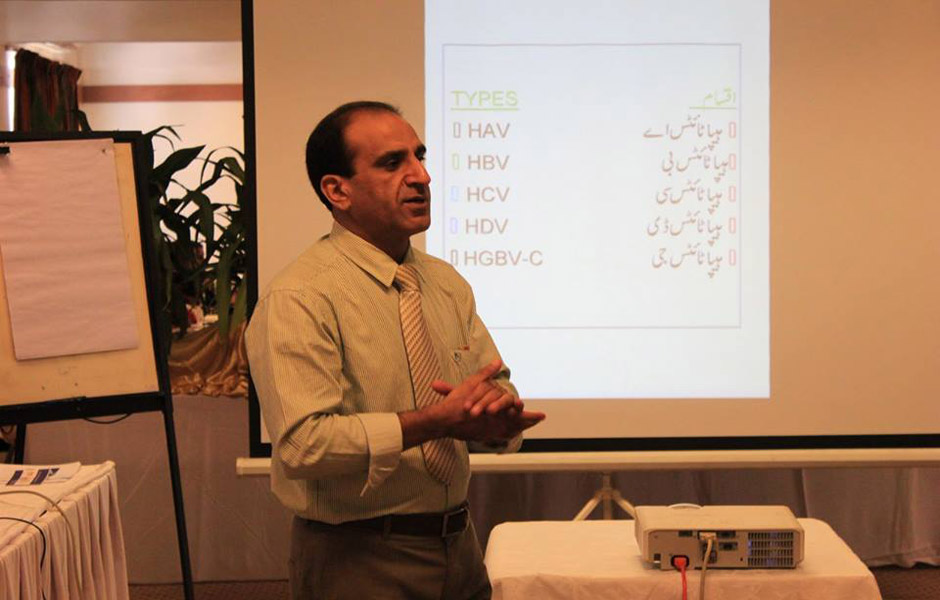Project Description
INTRODUCTION & BACKGROUND:
Prevalence of HCV infection reported in various studies by the Pakistani authors ranges from 2.2-14%. Over 10 million people in Pakistan are infected with HCV, making it the 2nd largest country after Egypt with HCV infection. Within Pakistan, the HCV prevalence rate varies between the four provinces; prevalence rate reported in Punjab is 6.7%, in Sindh 5%, in Baluchistan 1.5%, and in Khyber Pakhtun khwa 1.1%, respectively. Injudicious use of injections had been reported as a major risk factor for HCV infection in Pakistan. People who inject drugs (PWID) are at an even higher risk of acquiring HCV infection. In studies conducted by Kuo et al in Lahore and Quetta in 2003, HCV prevalence rate was 93percent and 75percent in PWID. Other risk factors for the transmission of HCV infection were injections given by health care workers, sex workers as well as household contacts. Despite global progress in understanding the epidemiology of the human immunodeficiency virus (HIV) and Hep C (Hepatitis C), knowledge about the HIV-HCV co infection in Pakistan remains very limited and subject to much controversy, lack of knowledge, awareness and testing/treatment issues. Till May 2014 no comprehensive study at the National level was conducted to have a comprehensive, data-driven synthesis of the HIV-HCV co infection. Consequently, the effectiveness of policies, programs, and resources intended to address the co-infection has been compromised. The disease is becoming a major health problem of developing countries. Reportedly within HIV Community the biggest death reason is HIV/HCV Co-Infection. According to WHO latest statistics [http://healthncare.info/], 7% of the population in Pakistan is Hep-C infected. Hep C pandemic in Pakistan is generalized in the general population with great concentrations in certain groups. In PLHIV, the IV drug users have extraordinarily high prevalence of Hep-C. Peg interferon and Interferon injections are being used as a common treatment, which is not only costly but very complicated due to its side effects. The Hep-C anti retroviral Sovaldi [Sofosbivour] has been recently introduced in Pakistani market on limited scale. Gastroenterologists generally treat Hep C cases in Pakistan. In 2015 Froze Sons, a Pharma company has entered into agreement with Gilead for local production of Sofosbivour. More Pharma companies are being registered for its production and it is expected that process will come down further. The HCV prevalence in Pakistan is even more pronounced among high risk population. The commonest mode of transmission is the use of injections, unsterilized needles and contaminated instruments.
ONSET OF THE PROJECT:
As the modes of HIV and HCV transmission are almost same therefore the HCV prevalence within HIV Community is not much unnatural. Keeping same grave situation in mind the APLHIV in with support of Asia Pacific Network of people Living with HIV [APN+] launched an initiative to educate the HIV Community on HCV, HIV/HCV Co-Infection and its management in 2014.the initiative has been named as “THIS IS HAPETITIS, KNOWIT-CONFRONT IT”. The initiative focuses on to educate the selected PLHIV and members of PUD community from across the country on matters related to Hep-C, HIV-HCV Co-infection and associated issues including basic information, prevention, testing methods and administering the treatment. The project commenced in 2014 and through this project the APLHIV sensitized selected PLHIV across the country on issues related to Hepatitis-C; HIV-HCV Co-infection and associated matters, including basic information, prevention, and screening/testing methodology and administering the treatment, in Phase I, through seven (7) interactive training sessions across the country. 395 community members were provided basic information about HCV, HIV/HCV Co-infection and its management. In Phase II the APLHIV carried out HCV mapping exercise across the country to collect data on HCV prevalence in HIV community. The purpose of study was to determine the zero-prevalence of Hepatitis C, among the PLHIV community (with PWID back ground) in Pakistan. A total of 350 PLHIV participated in the study from all the provinces and Azad Jammu &Kashmir (AJK). Participation in the study was completely voluntary and informed consent was taken from each participant after explaining the objectives and potential risks and benefits of participation. The study subjects were tested using HCV antibody test the enzyme immunoassay (EIA and Elisa), for the detection of Antibody to Hepatitis C Virus (Anti-HCV) in human Serum or Plasma. The test has an overall accuracy up to about 99%. A total of 350 PLHIV all of whom were with injecting drug use background participated in the study. The study was conducted in thirteen (13) cities (coupled as 11) in all the provinces and Azad Jammu and Kashmir. The overall HCV prevalence recorded was 91.7% (N=321); with borderline cases included, the prevalence was found 95.4% (N=334). The Report can be accessed by Clicking on the Tab “Reports on the main page. In Phase III of the project the APLHIV is engaged to provide awareness to more community people and more over to Advocate for the treatment issues related to HCV. A comprehensive informative booklet has also been developed and published by the APLHIV on HCV, HIV/HCV Co-Infection.

